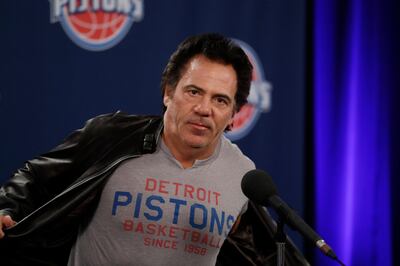When Lorena Tassinari walked into a Dallas courtroom to claim a share of Mexico's largest tortilla fortune, she had all the charm and fame of a former telenovela star on her side.
She still walked out with nothing. Ms Tassinari says she married the late tortilla king, Roberto Gonzalez Barrera, aboard his luxury yacht and shared his final three years. But the Texas judge, like predecessors in Mexico, ruled in favour of Mr Gonzalez's wife of half a century, Graciela Moreno Hernandez.
The legal saga isn't quite over: Ms Tassinari has appealed the latest verdict. Still, after five years and multiple lawsuits on both sides of the border, it is the matriarch who has emerged victorious at every point. She has control of Gruma SAB de CV, the world's largest tortilla maker – and a net worth of US$2.6 billion, according to the Bloomberg Billionaires Index.
Ms Tassinari, a singer and actress in the early 1990s Mexican soap operas Muchachitas and Balada por un Amor, said she married Mr Gonzalez in the Caribbean in the summer of 2009. After his death at the age of 81 from pancreatic cancer in August 2012, she claimed she was entitled, as his surviving spouse, to a piece of the fortune he left his family.
In her telling, Mr Gonzalez enjoyed a second lease on life in his final years, when they were together. Ms Tassinari said she wasn't after the money. "I'm only looking for dignity, honesty, and to defend my morals," she said. "I know how to live with nothing, and with everything."
The singer's courtroom defeat has confirmed Graciela Moreno as the main owner of Gruma, which has a market value of about $6.1bn. She is the head of the family that controls 52 per cent of outstanding shares, according to the company's 2016 annual report. Her son, Juan Antonio Gonzalez Moreno, serves as chairman and chief executive. He is the only member of the family's younger generation to take an active executive role, and controls a 10.9 per cent stake. The family declined to comment on the net worth calculation, and Graciela Moreno declined via Gruma representatives to be interviewed.
Mr Gonzalez married his first wife in 1949, the same year that he and his father founded Gruma's precursor, a small corn mill.
The company’s brands like Mission tortillas and Maseca flour are now staples for shoppers in America as well as Mexico. But it struggled initially – partly because Mr Gonzalez was trying to persuade Mexicans to embrace a new type of dehydrated corn tortilla. Most preferred the fresh ones they could get from street vendors.
Tom Gores
Tom Gores built a private equity empire that made him rich enough to buy professional basketball's Detroit Pistons and become a civic leader in Michigan.
Now the billionaire's firm has struck a deal to buy Securus Technologies, a company that provides telephone services to Michigan prison inmates at rates of up to $22.56 for a 15-minute call.
Critics say the lucrative venture could tarnish the image of the team owner who has won plaudits for returning the National Basketball Association Pistons to downtown Detroit and for helping to raise $10 million to help Flint, Michigan, his boyhood home poisoned by lead in tap water.

“It would fundamentally seem at odds with his and the Pistons’ best interests to be affiliated with a company like Securus,” said Aleks Kajstura, legal director of the Prison Policy Initiative that works to expose harms of mass incarceration. “Securus preys on the very community that the Pistons and Gores support.”
Mr Gores’ Platinum Equity asked the Federal Communications Commission to approve its purchase of closely held Securus for a reported $1.6 billion. The Dallas-based company provides phone service to 1.2 million inmates at facilities across the United States and Canada. Objections from the Prison Policy Initiative and other activists knocked the deal off a quick track for approval at the FCC. There is no deadline for the agency act.
The purchase “is a microcosm for everything that is wrong with the prison-industrial complex”, groups objecting to the sale told the FCC in a filing.
The sale would bring the current owner, private equity firm Abry Partners, about $960 million more than it paid four years ago when it bought Securus for $640m from yet another private equity firm.
“They built it on the back of inmates and their families,” said Lee Petro, a Washington-based attorney representing inmates’ families that object to the sale and other groups, said in an interview. “All of that money came from charging inmates and their families excessive rates.”
Mr Gores, 52, founded Beverly Hills, California-based Platinum Equity in 1995. He is worth $3.4bn, according to data compiled by Bloomberg. Platinum Equity now has more than $11bn of assets under management and has a portfolio of about 30 operating companies that serve customers around the world, according to its FCC application.
He graduated from Michigan State University. In 2011, he bought the Pistons and last year announced they the team would move back to downtown Detroit after leaving for the suburbs in 1988. He also pledged to raise $10m to help Flint recover from having lead in its drinking water.
Platinum and Securus say in filings one reason for the FCC to approve the deal is that the sale will not change much. The same officers will run the company, and Securus “will continue to provide high-quality services to the same extent and at the same rate,” according to a May 11 application for deal approval.
Chuck Bundrant
Chuck Bundrant was a college freshman with $80 in his pocket when he drove halfway across the country to Seattle to earn a few bucks fishing. The year was 1961.
He hasn't stopped fishing since.
Today, Mr Bundrant, the founder and majority owner of Trident Seafoods, is worth at least $1.1bn, according to the Bloomberg Billionaires Index. His wealth is due to a fair measure of pluck. Back in the early 1980s, he persuaded Americans to eat pollock, then considered a trash fish, at fast-food restaurants and, to this day, Trident ships it – along with salmon and cod – to chains including Costco and Safeway.
Along the way, Mr Bundrant cultivated politicians who would pass legislation that aided Trident's business by keeping foreign fisheries at bay. These days, Trident also is benefiting from health-conscious consumers gravitating to seafood.
The Bloomberg index calculates that Mr Bundrant owns 51 per cent of privately-held Trident, which had $2.4bn in revenue last year, based on information compiled from trade groups. It is valued by the Bloomberg index at about $2.1bn, using comparisons to five publicly traded peer companies, including Clearwater Seafoods and Oceana Group. Trident operates about 16 processing plants and 41 fishing vessels and remains defiantly independent.
"We don't answer to investment bankers like some other seafood companies,'' the company writes on its website. "We only answer to our customers, our fishermen and our employees."
Mr Bundrant declined to comment. He named his son, Joe, chief executive officer in 2013 and is not involved in day-to-day operations, but longtime friend Brent Paine, executive director of trade association United Catcher Boats, recalls him as a "huge risk-taker, someone with an open mind for opportunity."
Chuck Bundrant's story is the stuff of industry legend. "He knew nothing about fishing boats, or catching and processing crab and salmon,'' son Joe said in a corporate video two years ago. "He'd only watched a movie with John Wayne in it called North to Alaska. And he heard there was money to be made on the fishing grounds, thousands and thousands of miles from home.’’
Today, Trident's business is buttressed by a surging market for fish as consumers seek to add healthy protein to their diets, according to research from the United Nations. An index of fish prices, the Oslo Seafood Index Global, has jumped more than 300 per cent over the past five years, propelled by rising salmon demand and higher prices.
Tom Barrack
Billionaire Tom Barrack has a lot in common with his long-time friend Donald Trump. He is a real estate mogul who has had massive successes and high-profile busts. He projects a wealthy image and rewards loyalists. And in January, he embarked on a new act that has been slow to gain momentum.
Mr Barrack's property empire has consolidated into Colony NorthStar, a real estate investment trust born near the start of the year from a merger of three companies: his own Colony Capital, NorthStar Asset Management Group and NorthStar Realty Finance. The new entity is making bets on health-care properties and warehouses, deals that are decidedly less flashy than Barrack's more famous transactions, such as investing in Nevada casinos and Michael Jackson's Neverland Ranch.
So far, Colony NorthStar has struggled to appeal to investors. Shares are little changed since the merger's completion, trailing some rival firms in a year where optimism over the Trump administration's agenda is helping to fuel a stock rally.
"We're in a transition," said chief executive Richard Saltzman, who has worked at Barrack companies for 14 years. "Burden of proof is on us, for sure, but I think people are leaning in. We've got a lot more work to do, but we're quite optimistic about what we are doing and how it's going to look six months to a year from now."
Colony NorthStar is now the main investment vehicle for the 70-year-old Mr Barrack, the company's chairman, marking the latest turn in a more than three-decade career in real estate and private equity. At the same time, he is becoming more known outside financial circles for his role as a Trump champion, from appearing on television to defend his policies to organising the inauguration. And while he doesn't hold an official role in the administration, Mr Barrack says he offers informal advice to the president.
"The best thing I can do is be a friend and be able to tell him when he's off base without him firing me," Mr Barrack said in an interview.
The billionaire built his career from bets on seemingly out-of-favour assets. The son of a Lebanese grocery store owner, he worked as a lawyer in the Middle East and had a stint in the interior department of president Ronald Reagan's administration before joining the investment firm of Texas billionaire Robert Bass in the 1980s. There, he capitalised on the savings and loan crisis by buying distressed assets from failed thrifts, working with the likes of David Bonderman, who went on to co-found TPG Capital. Mr Barrack also helped to engineer the sale of New York's Plaza Hotel to a prominent real estate investor: Donald Trump.
"I learnt from him a lot of things about instincts and how he evaluates people," Mr Barrack said. "We were both contrarians, but he was better, brighter and more aggressive in building his own brand. I had great people around me and the wind at my back a little."
With money from Bass, Mr Barrack founded Colony Capital in 1991 and built a private equity giant by investing in soured loans and real estate, including celebrity-centric deals such as buying Neverland Ranch and saving photographer Annie Leibovitz from bankruptcy. The company persevered after some missteps in the mid-2000s – including backing the $8.5bn purchase of Station Casinos, which ended up going bankrupt, and getting crushed on Xanadu, the trouble-plagued $2bn retail and entertainment complex in New Jersey's Meadowlands, during the financial crisis – and Mr Barrack now has a personal fortune that is estimated at $1.3bn, according to the Bloomberg Billionaires Index.
His collection of residences includes a ranch, polo facility and winery near Santa Ynez, California, and a condo in Manhattan's Trump Parc East. In Los Angeles's Bel Air neighbourhood, he is developing a mansion that will be at least 53,000 square feet that a Colony spokesman said is being built for a friend, whom he declined to identify.
* Agencies






